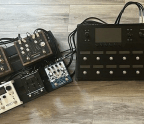


THE INFLUENCE OF American music on British acts — and vice versa — is well documented and has been going on since the birth of rock ’n’ roll in the Fifties. The tables were turned in the Sixties with the British invasion, led by the Beatles, the Rolling Stones and the Who. But since the Seventies, it’s fair to say that the influence going back and forth across the Atlantic has been evenly balanced. In spite of the global cross-pollination of musical influences, there remain acts who are massively successful in their native territories yet fail to achieve very much of note any further afield. Many British acts have achieved almost global dominance yet have failed to score more than a handful of hits, at best, in the United States.
From a sales point of view, the figures speak for themselves: Status Quo are still active and have racked up total sales of approximately 118 million. Slade split up in 1992, having scored sales of more than 50 million worldwide since their first hit in 1970. Sweet were glam-pop superstars in the early Seventies, scoring an amazing run of 16 hit singles between 1971 and ’78, with album sales in the region of 35 million. Dr. Feelgood’s sales were relatively modest compared to the three previous chart heavyweights, but as precursors to the punk explosion in Britain, they heralded a vital new approach to making music. Songs cut to the bone, running at three minutes or shorter, and with an image that was lifted by numerous punk acts. Their influence spread across the Atlantic to America, when Blondie’s drummer, Clem Burke, brought their debut album, Down by the Jetty, back to New York with him in 1975. It became glued to turntables at parties with all the prime movers on the NYC punk scene in attendance — and taking notes.
Slade, Quo and Sweet all came up through the same club circuit in the U.K. in the Sixties. They knew each other from the numerous occasions when their paths would cross, and all served their time honing their songwriting chops and learning how to work a hostile crowd. Dr. Feelgood came up through the U.K. pub rock circuit, which was largely based in London, and saw an explosion of back-to-basics rock ’n’ roll and vintage Stonesy R&B, played in sweaty barrooms to rabid punters, desperate for a fix of something other than the glam pop excesses of the early Seventies or the tired old prog and pomp rock dinosaurs. If this sounds like a familiar tale — the birth of punk — you’re right. Except for one key point: It wasn’t the likes of the Sex Pistols and the Clash who started that ball rolling; it was the brutal, relentless bands such as




